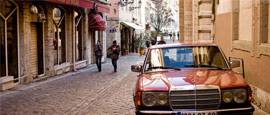Lyon History
The history of Lyon begins on Fourvière Hill, where vestiges of the original Roman city (Lugdunum, meaning the 'City of Light') are still evident. Founded in 43BC by Roman consul Lucius Munatius Plancus, it went on to become one of the most important cities in Gaul and for more than 300 years, was one of the biggest trading towns in the Empire.
In the years that followed the Roman collapse, Lyon retained its premier political position under a succession of conquering rulers; first as part of Lotharingia, then the Kingdom of Burgundy and finally as a part of the Holy Roman Empire. While not much architecture from this period remains, the buildings created after Lyon was annexed by Phillip the Fair of France in 1342 do.
Even more can be seen from the 15th century, in particular the Renaissance period, when Lyon enjoyed a rebirth of its own. This came as a result of its increasing importance as a place for trade under the auspices of the Dukes of Savoy, as well as its pre-eminence in the silk making and printing businesses.
This boom continued well into the 18th century, with Lyons’ increasing profitability speeding up during the reign of Napoleon who insisted that all countries under his control buy Lyonnais silk and Lyonnais silk alone.
Lyon’s pre-eminence in the silk trade continued well into the 20th century, only really coming to an end during the dark days of WWII when its role as a centre for the French Resistance resulted in much destruction and harsh punishments for its citizens.
Industrialisation and diversification into other businesses dominated the post-war years as Lyon lost out to India and China in the silk trade. The problem was that both could make silk more cheaply. Today, however, it is a thriving modern city that continues to flourish, silk or no silk.
Did you know?
• Croix Rousse Hill, the former home of the city’s silk workers, is crisscrossed with passages known as traboules.
• St Blandina was martyred in the city’s Roman Amphitheatre of the Three Gauls.
• Crédit Lyonnais, one of France’s biggest banks, was founded in and named after Lyon.
Do you have any Feedback about this page?
© 2026 Columbus Travel Media Ltd. All rights reserved. No part of this site may be reproduced without our written permission, click here for information on Columbus Content Solutions.




 You know where
You know where